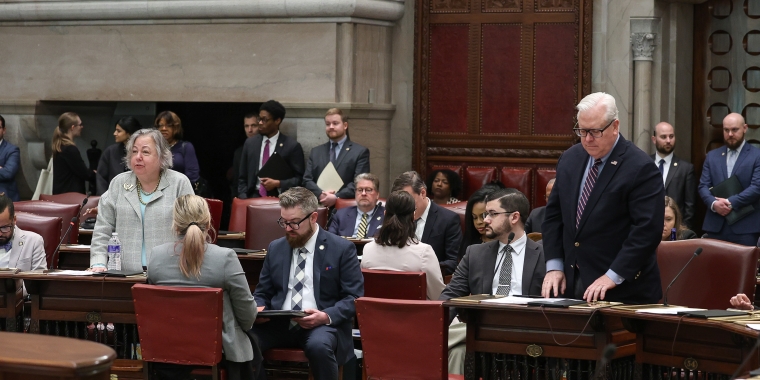
Senator Krueger Praises Senate for Restoring $1.2 Billion to Health Budget and Moving New York Towards Primary & Preventive Care Model
Liz Krueger
April 1, 2009
(Albany, NY) – Senator Liz Krueger praised the New York State Senate for passing its healthcare budget today and for restoring more than $1.2 billion of the proposed $3.3 billion worth of cuts in the Executive budget.
"As the Senator who represents what's often referred to as bed pan alley I am especially pleased with the healthcare budget that was passed today," said Senator Krueger. "In the face of one of the worst economic crises in decades the Senate was able to pass a healthcare budget which will cut costs without compromising peoples' well being. I am confident that a number of the investments made in this budget will lead to better long-term healthcare for New Yorkers"
Some highlights of the healthcare budget include:
• Securing vital reforms that will move New York to a more cost-effective primary and
preventive care model of service.
• Rejecting $512 million in proposed cuts to our hospitals.
• Ensuring that—for the first time since 1981—Medicaid will pay a fair price for inpatient
services and improve reimbursement for primary care and other outpatient services at
hospitals and clinics.
Successfully opposing a 2 percent across-the-board Medicaid rate reduction.
• The Senate also passed some new investments in the budget which included:
• $127 million for community–based health clinics.
• $75 million for hospitals statewide.
• $25 million for academic medical centers.
• $24.5 million for safety net hospitals.
• $24.5 million for high Medicaid hospitals.
"These are significant additions and show the commitment that has been made to expand and emphasize direct patient care," said Senator Krueger. "Care that is delivered on an out-patient basis in an accessible place will help treat illness at the earliest stage and will be cost effective. Emergency rooms are too expensive to be the first stop for healthcare."
Recognizing the importance of retaining quality, accessible and affordable healthcare during a great economic crisis, the Senate led the fight to adopt much needed Medicaid reforms that will improve patient care and health outcomes while investing in community-based primary care infrastructure and facilities.
New York’s current Medicaid system too often fails to provide good access to primary and preventive care, resulting in poor health outcomes and unnecessarily expensive inpatient hospital treatment for beneficiaries. The healthcare policy and funding priorities established in the budget by the Senate, Governor and Assembly will ensure that less money is spent on avoidable acute and emergency-room care in the long run and that a patient-driven system becomes the norm.
To meet that goal, the budget invests $63 million in state funds into the development and enhancement of community-based primary care health centers, which will be matched by $63 million in federal funds. And the budget includes a half-billion dollars in funding for hospitals and networks to assist in the transition to a patient-driven system that provides better access to needed care in the most effective setting.
"The long-term goal is to limit costly emergency room visits," said Senator Tom Duane (D-Manhattan), Chair of the Senate Health Committee. "People should not be forced, or feel for whatever reason, that they should wait to get checkups and the regular care that we all need. This is a particular problem facing underserved and rural areas where travel from one’s home to the doctor can be difficult. This was a very tough year for the budget, but in all, we not only preserved but expanded vital aspects of our healthcare system and for good reason—every one of us depends on these services."
Added Senator Krueger, "Care delivered at the community level can often be more sensitive to patient needs and therefore result in better patient outcomes. It also can result in a quicker, targeted response to specific health issues in a community, like a rise in STDs, HIV, or domestic violence."
The budget also provided more funding for academic medical centers which provide training for physicians throughout the state and in fact the world. The research conducted at these sites often results in advances in medical practice.
"My Senate district has the greatest cluster of academic medical institutions in the world," said Senator Krueger. "We are grateful to have these facilities in 26th Senate District and by investing in them we will keep doctors from leaving New York and attract more grant dollars from the private sector by showing that the State is committed to the success of these institutions."
Share this Article or Press Release
Newsroom
Go to NewsroomSenator Krueger's April 2025 Update
April 25, 2025

We The People: Taking Action to Save Democracy
April 24, 2025


